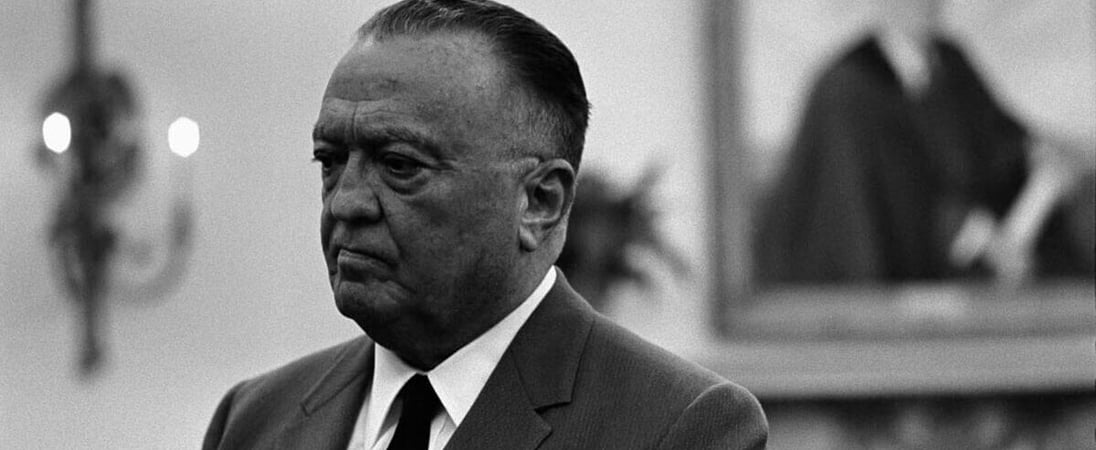
J. Edgar Hoover's birthday
J. Edgar Hoover, born on January 1, 1895, was a law-enforcement personality who led a remarkable life. He became the first Federal Bureau of Investigation (FBI) director and held this position for nearly half a century.
Hoover’s work transformed law enforcement in America. Known for his strong will and strict ways, he played a key role in shaping modern investigative techniques.
His life, filled with both praise and controversy, left a lasting impact on the FBI and the country.
J. Edgar Hoover’s Early Years
J. Edgar Hoover’s early life began in Washington, D.C. He was born into a family of civil servants on January 1, 1895. Growing up, Hoover showed a keen mind and a strong sense of order.
As a child, he loved reading and excelled in school. His dedication to academics stood out from an early age.
Hoover’s education journey took him to Central High School, a well-known school in his hometown. Here, he thrived in his studies and participated in various activities. He joined the school’s debate team, showcasing his talent for speaking and arguing. Hoover’s leadership skills began to shine during these formative years.
J. Edgar Hoover’s Triumphs
After high school, Hoover attended George Washington University. He pursued a law degree, driven by a deep interest in justice and order. While studying, Hoover worked at the Library of Congress.
This job honed his research and organizational skills. These skills later proved invaluable in his career with the FBI. Hoover’s time at university laid the foundation for his future role as a national leader in law enforcement.
J. Edgar Hoover’s rise to prominence began with his work at the Justice Department. Here, he quickly made a name for himself with his sharp mind and dedication. In 1924, his life took a significant turn when he became the head of the Bureau of Investigation, later known as the FBI.
As the director, Hoover reshaped the FBI. He introduced rigorous training for agents and advanced forensic methods.
Under his leadership, the FBI became a symbol of efficiency and professionalism in law enforcement. Hoover’s focus on modern techniques, like fingerprinting and criminal records, revolutionized crime investigation.
One of Hoover’s major achievements was fighting organized crime. In the 1930s, America faced a surge in gangster activity. Hoover and his FBI took on notorious criminals like John Dillinger and Al Capone. Their successes made the FBI famous and won public admiration.
Hoover also played a key role in anti-espionage and counterintelligence during World War II and the Cold War. His efforts helped protect the United States from foreign threats. This work, though controversial at times, showcased Hoover’s commitment to national security.
Beyond crime-fighting, Hoover was a master of public relations. He used media to shape the FBI’s image and promote its successes. Hoover’s ability to maintain a strong public presence helped elevate the FBI’s status in American life.
Hoover’s influence extended beyond crime-fighting. He established rigorous training programs for FBI agents. These programs set high standards for law enforcement across the country. His dedication to excellence made the FBI a model for police organizations worldwide.
Despite controversies surrounding his methods and use of power, Hoover’s impact on American law enforcement and national security remains undeniable. His life’s work left a lasting legacy in the FBI and criminal justice field.
Interesting Facts About J. Edgar Hoover
Choir Singer: In his youth, Hoover was a choir member at his local church, showcasing his musical talent.
Collector of Compromising Information: J. Edgar Hoover was known for amassing sensitive information on prominent figures, including politicians and presidents.
Strict Dress Code for FBI Agents: He implemented a strict dress code for FBI agents, requiring them to wear suits and adhere to a professional appearance.
Never Married: Hoover never married and was extremely private about his personal life, leading to speculation over the years.
Fear of Fire: He had a lifelong fear of fire and often took several precautions to protect himself against it.
Named a Firing Range After Himself: The FBI’s firing range was named after Hoover during his lifetime, a testament to his ego and influence.
Hoover’s War Against Subversion: He was intensely focused on what he perceived as subversive threats within the United States, leading to controversial surveillance and investigation tactics against suspected communists and civil rights activists.
Also on this date...
Polar Bear Plunge Day
Taking a chilly plunge, all for a noble cause — uniting people in a frozen adventure to support those in need.
National Bloody Mary Day
Start your morning with a refreshing tomato juice and vodka cocktail, swap in different spirits or pair with crackers, olives and cheese.
Global Family Day
Each year, Global Family Day comes with opportunities to celebrate the importance of the family unit as a building block for a better tomorrow.
National Hangover Day
Spare a moment for anyone who has ever been to a New Year’s Eve party and had a bit too much to drink...




